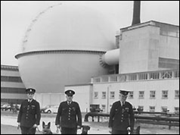 |
| Dounreay's dome has
become a familiar landmark |
|
1966: New nuclear reactor for
Dounreay |
Artificially 1969:
The A nuclear
reactor described as "the system of the next century" is to be built at
the Dounreay power station on the north coast of Scotland.
Minister for Technology Frank Cousins made the announcement in
parliament today.
Dounreay has been awarded the ?0m Prototype Fast Reactor (PFR) in the
face of competition from the Winfrith nuclear power station in Dorset.
Dounreay's remote location in Caithness, Scotland's most northerly
county, was an important factor when construction of the nuclear power
station began in 1955.
Its remoteness is believed to be one of the reasons why the PFR will be
built there.
But Mr Cousins said the government had also taken into consideration
the fact that Dounreay already had many of the required skilled staff and
the necessary facilities.
At a press conference, Mr Cousins said there had been a change in
attitude towards nuclear power and many local authorities had wanted the
PFR built in their area.
Mr Cousins said the new reactors were "the future".
"They will be able to produce new nuclear fuel in the course of their
operation and offer a prospect of even greater economy, as well as
conservation in the use of uranium," Mr Cousins explained.
Scientists say the technology used by the PFR is the most economical
way to produce electrical power.
Current nuclear reactors can extract only 2% of the energy available in
nuclear fuel compared with up to 10% for the new reactors.
The United Kingdom Atomic Energy Authority (UKAEA) will build and
operate the prototype reactor.
UKAEA chairman Sir William Penney said it was hoped to have commercial
power stations in operation by 1978.
But they would have a "real tough time" meeting that target, Sir
William added, and it not come to fruition until a couple of years later.
Dounreay was the world's first electricity-producing "fast" reactor -
the reactor itself being enclosed in a distinctive dome.
The new reactor will benefit the local economy in Caithness with 700
construction jobs to be filled.